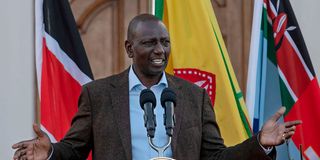Do not expect change on appointments

President William Ruto. There is a complaint that members of the President’s and Deputy President’s ethnic communities dominate government appointments yet the two are supposed to foster national unity in their appointments.
There is a complaint that members of the President’s and Deputy President’s ethnic communities dominate government appointments yet the two are supposed to foster national unity in their appointments.
They are supposed to be detribalised because they are national figures.
This may happen for the following reasons. One, the government is formed through a political process. People vote for their representatives periodically to the government since our representation is delegated. In a multiparty democracy, parties compete to form a government to implement their manifestoes or ideologies.
When a political party comes to power, it will appoint only those who believe in, and understand, its manifesto to the government. But in Africa, political parties are ethnic; they are not based on ideology. We subscribe to a political party because of its leader(s). We follow individuals, not parties.
Since the return of multiparty in late 1991, this has been the trend. Political parties draw their support from regions where their leaders come from. For example, Ford-Asili and DP had their support, hence membership, from central Kenya and Ford-Kenya in Nyanza because their leaders were from those regions. Kanu drew its support largely from Rift Valley. We should not expect a change any time soon.
Two, ethnic allegiance is stronger than anything other than family bonds. It is stronger than even religion and nationalism. This was compounded by our post-independence leaders, who resorted to their tribes when they failed to have their way. They would whip them up in the hope of achieving their goal.
Tanzania, which did not go this route, has stronger allegiance to the nation than tribes.
The President and DP are not the problem, however. We are. The day we’ll stop following leaders but parties, then government appointments will not be skewed the way they seem to be. You will find all ethnicities fairly distributed in government posts.
Let us educate ourselves on multiparty politics before we apportion blame. Let’s educate ourselves on political parties before we become defensive.
Kilion Abeka, Homa Bay
* * *
Noordin Haji’s appointment as director-general of the National Intelligence Service (NIS) is a paradox to national security.
Considering his performance in the last phase as the Director of Public Prosecutions, Kenyans had lost faith and confidence in him. He is the proverbial tree that reached menopause and could no longer flower.
Initially, when Haji was the DPP and George Kinoti the Director of Criminal Investigations (DCI), their combined effort unearthed much scum, particularly through the operation “Kamata Kamata” .
But with the new government, he inexplicably dropped graft charges against prominent people with abandon. A misstep in NIS as it was in ODPP would hurt Kenyans beyond superlative comparison.
David Ooko, via email




